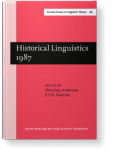Table of contents
Forewordv
Conflicting teleologies: drift and normalization in the history of Icelandic phonology21
Language change: cyclical or linear? The case of the Romance future37
Syntactic reconstruction and Finno-Ugric51
Case assignment and NP movement in the history of Scandinavian95
Domesday Book and Late Old English dialects107
Bilinguisme et interférences: le cas de l’anglais sud-africain129
Reanalysing actualization, and actualizing reanalysis141
The rise of om in Middle Dutch infinitive constructions161
Discourse functions and syntactic change175
Framing the linguistic communication scene: ask vs. acsian and biddan191
La polysémie de of en vieil anglais et la métaphore spatialisante211
Le cadre des changements phonétiques dans les langues romanes: mot et ‘syntagme phonétique’231
Le rôle du système dans l’évolution d’un verbe en grec ancien245
Whatever happened to the ablaut nouns in English — and why did it not happen in German?253
Sources négligées dans l’histoire du vocabulaire: les dictionnaires bilingues du seizième siècle265
Shall or will ? Choice of the variant form in Early Modern English, British and American275
Le développement de ce que en français et l’évolution du relatif-
interrogatif-exclamatif289
L’enfer de brumes et marais dans la tradition germano-celtique. Un problème mythologique
et linguistique indo-européen303
The structure and development of possessive noun phrases in Hittite309
The ghost of the agent in Romance327
Non-adjacency in geminate structure: an historical perspective339
Modes of inference and the gradual/rapid issue: suggestions from the English modal353
A case of Proto-Indo-European allomorphy: the instrument noun suffix *-tlom and its variants363
Ouir, entendre, comprendre: une vue psychoméchanique sur le renouvellement du lexique375
Neutralisation sémantique et marquage fonctionnel: à propos de l’évolution de certains emplois de celui et de ce en
français387
Romance comparative grammar and linguistic change399
Local and global change in word formation411
Germanic Verschärfung: tying up loose ends425
Mécanismes et nature du changement syntaxique: le cas de la phrase complexe en indo-européen443
The unaccusative hypothesis and the history of the perfect auxiliary in Germanic and Romance461
Functional differentiation in the emerging English standard language: the evolution of a morphological discourse and style marker489
Verb phrase conjunction in Old English499
Évolution droite ou sinueuse: les palatales du français517
On the history of grounding markers in English narrative: style or typology?531
Cognitive Grammar and Kuryłowicz’s laws of analogy543
Semantic change in Romance words for “cut”553
Index of Names compiled by Hans Boon563
Index of Languages compiled by Hans Boon573
This article is available free of charge.
